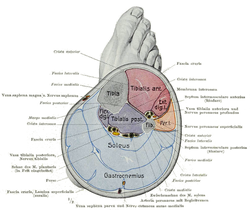Fibula
| Fibula | |
|---|---|

Position of fibula in human male (shown in red)
|
|

Cross section of human lower leg, showing fibula in centre (latin terminology)
|
|
| Details | |
| Articulations |
Superior and inferior tibiofibular joint |
| Identifiers | |
| Latin | (os) fibula |
| MeSH | A02.835.232.043.650.321 |
| TA | A02.5.07.001 |
| FMA | 24479 |
|
Anatomical terms of bone
[]
|
|
Superior and inferior tibiofibular joint
The fibula (/ˈfɪbjᵿlə/) or calf bone is a leg bone located on the lateral side of the tibia, with which it is connected above and below. It is the smaller of the two bones, and, in proportion to its length, the slenderest of all the long bones. Its upper extremity is small, placed toward the back of the head of the tibia, below the level of the knee joint, and excluded from the formation of this joint. Its lower extremity inclines a little forward, so as to be on a plane anterior to that of the upper end; it projects below the tibia, and forms the lateral part of the ankle-joint.
The bone has the following components:
The blood supply is important for planning free tissue transfer because the fibula is commonly used to reconstruct the mandible. The shaft is supplied in its middle third by a large nutrient vessel from the fibular artery. It is also perfused from its periosteum which receives many small branches from the fibular artery. The proximal head and the epiphysis are supplied by a branch of the anterior tibial artery. In harvesting the bone the middle third is always taken and the ends preserved (4 cm proximally and 6 cm distally)
The fibula is ossified from three centers, one for the shaft, and one for either end. Ossification begins in the body about the eighth week of fetal life, and extends toward the extremities. At birth the ends are cartilaginous.
...
Wikipedia
